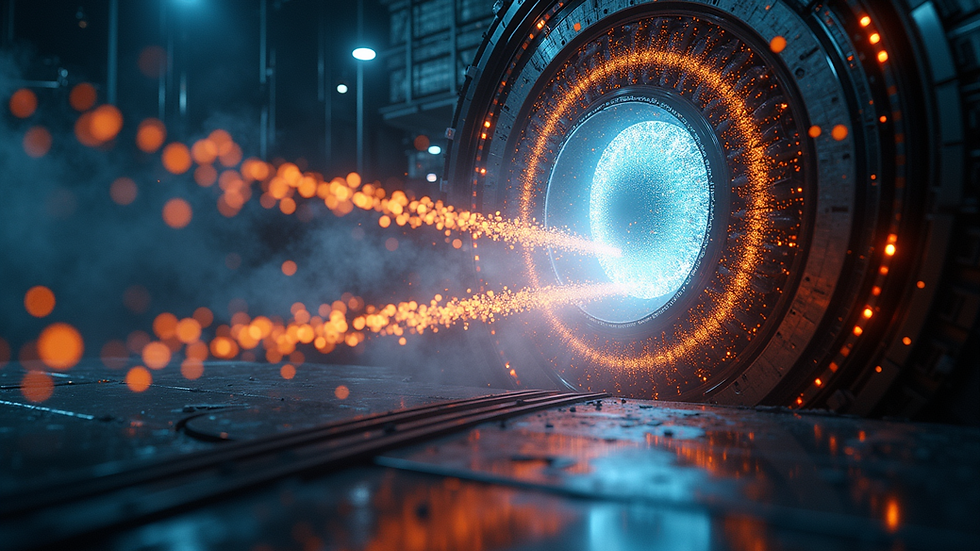Unlocking the Mysteries of Particle Physics Through Quantum Computing Simulations
- April C.

- Aug 14
- 4 min read
Updated: Aug 15
Quantum computing is paving the way for revolutionary advancements in various fields, and particle physics is no exception. With their unparalleled ability to process data, quantum computers are becoming essential tools for simulating complex interactions in particle physics. This blog post examines how these powerful simulations enhance our understanding of high-energy particles and the universe itself.
The Intersection of Quantum Computing and Particle Physics
Quantum computing uses the principles of quantum mechanics to perform calculations in ways that classical computers can't match. Unlike traditional bits that can only be 0 or 1, quantum bits (or qubits) can be in multiple states at once. This feature allows quantum computers to handle complex calculations, drastically speeding up processes that would take traditional computers years.
In particle physics, researchers are focused on understanding the fundamental forces and particles that shape our universe, using particle colliders like the Large Hadron Collider (LHC). For context, the LHC generates about 1 petabyte of data every second during particle collisions. The sheer scale of this data, coupled with the complexity of interactions, poses significant challenges for traditional analysis.
Quantum simulations can fill this gap, offering insights into particle interactions that are otherwise difficult to achieve. For instance, simulations can help analyze data more efficiently, enabling scientists to draw conclusions faster and with greater accuracy.

The Role of Simulations in Particle Physics
Simulations are critical in particle physics research, as they allow scientists to model scenarios and predict outcomes based on data. They enhance our understanding of fundamental forces, such as electromagnetism and the weak and strong nuclear forces.
For example, researchers can use simulations to model how particles behave under extreme conditions, such as those generated in collisions at the LHC. This has led to the identification of the Higgs boson, a particle that helps explain why some particles have mass. Quantum computing can accelerate these simulations significantly, processing massive datasets far quicker than classical methods.
To illustrate the power of quantum computing, imagine this: While a classical computer might take years to simulate a complex particle interaction in a collider, a quantum computer could accomplish the same task in just minutes. This leap in efficiency opens doors to exploring quantum entanglement and the particle behavior at extremely high energies.
Challenges and Opportunities
While the prospects of using quantum computing in particle physics are exciting, several obstacles stand in the way. Currently, quantum computers are still maturing, with challenges like qubit instability and high error rates present. As of now, most quantum systems have just few dozen qubits, making complex calculations limited.
Moreover, developing effective algorithms for quantum simulations requires significant research and collaboration across disciplines. Many teams are working on creating new algorithms specifically designed for simulating particle interactions. Winning this technical challenge is crucial for realizing the full benefits of quantum computing.
Despite these hurdles, the potential of quantum computing in particle physics is too significant to ignore. Progress is ongoing. With improved algorithms and advancements in hardware, breakthroughs in particle physics research could be just around the corner.

The Future of Particle Physics with Quantum Simulations
Looking forward, the combination of quantum computing and particle physics research could lead to unprecedented discoveries. Enhanced simulations may reveal new particles and concepts that challenge current theories of physics.
For instance, the ongoing research into dark matter and dark energy—important aspects of the universe—could gain significant insights from quantum simulations. By modeling how these elusive particles might interact, researchers can explore ideas that were previously beyond reach.
Moreover, breakthroughs in quantum computing could allow scientists to investigate phenomena that extend beyond the Standard Model of particle physics. Such advancements may lead to new fundamental forces or particles, reshaping our understanding of the cosmos.
Unraveling the Universe's Secrets
Quantum computers are on the brink of providing vital insights into particle physics through advanced simulations. The collaboration between quantum computing and particle physics holds the promise of transformative discoveries, pushing the limits of what we currently know about high-energy particle interactions and the fundamental forces that govern our universe.
As technology continues to advance, the partnership between quantum computing and particle physics is set to drive exploration into the unknown. The quest to unravel the secrets of particle physics is just beginning, and quantum simulations will play a crucial role in charting this fascinating journey.

By: April Carson
---
Billions Are Moving Hands—Here’s How to Get Yours
Ready to elevate your consciousness and expand your mind?








Comments